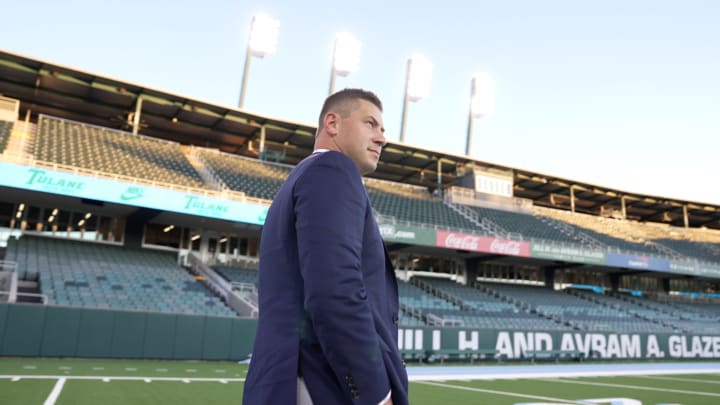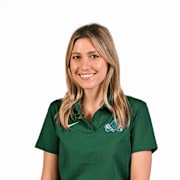How Tulane's New Head Coach Plans to Flip Misfortunes to Positive Outcomes

When the Tulane Green Wave face adversity this season, coach Jon Sumrall has a response for his team: good.
Sumrall brought his core values of attitude, toughness, discipline, and love to the program, but within those lies his philosophy of both football and life. Every day, the Yulman Stadium jumbotron displays the acronym ATDL to remind the team of those values. Two words have followed on each respective slide: good and best.
As Tulane prepares for the season opener against Southeastern Louisiana, they start a new era of football uptown with new coaches and upwards of 50 new players. They'll have a new quarterback for the first time since 2020, as well as their own legacy to leave behind.
Despite the significant changes, the team is locked in. In what’s considered “Monday” of a Thursday night game week on Saturday, they displayed a level of focus that they hadn’t fully reached thus far. With the amount of turnover Tulane saw this offseason comes a change in philosophy.
There's an instilled culture, but it's one that these players must create for themselves. 1-0 worked well for the 2022 team; it became more of an identity than a mentality. It’s what made them lock in and beat Houston with their third-string quarterback after their first loss of the year.
Instead of chanting 1-0 in the team huddle, they chant the four core values of attitude, toughness, discipline, and love. However, after four weeks of camp, I've wondered what the only other words to cross the jumbotron meant to coach Jon Sumrall and this team.
Best
Best is simple. Sumrall talks about the necessity for great teams to be player-led. That starts with self-leadership. He tells his players that all he wants is for them to wake up and be their best every day, whatever that best is. It prepares them for when their best is required. By practicing it daily, it codifies the mindset to be independent of the moment. It also teaches each player to discover their own unique version of "best." Sumrall's approach to people and relationship building continues to stand out as a core trait.
Good
Good is the intriguing one. It comes down to attitude. Sumrall uses Navy Seal Jocko Willink's video "Good" to teach his teams his core four values.
The speech, a snippet from his podcast, answers a question about how he handles setbacks, failures, delays, defeats, or other disasters. The full quote is worth reading:
“I have a fairly simple way of dealing with these situations. It’s one word: good. One of my direct subordinates pointed it out to me. When he pulled me aside or called me with a major problem or issue, I’d look at him and I’d say, Good.
- Jocko Willink
One day he was telling me about some issue that he was having. He said, I already know what you're going to say. I said, well, what am I going to say? He said, you're going to say good. That's what you always say. When something is wrong and going bad, you always just look at me and say good. I said, well yeah, I mean it. When things are going bad, there is going to be some good that comes from it.
Mission got cancelled? Good. We can focus on another one. Didn't get the new high speed gear we wanted? Good. We can keep it simple. Didn't get promoted? Good. More time to get better.
Didn't get funded? Good. We own more of the company. Didn't get the job you wanted? Good. You can get more experience and build a better resume. Sprained my ankle? Good. I needed a break from training. Got tapped out? Good. It's better to tap in training than to tap out on the street. Got beat? Good. You learned. Unexpected problems? Good. We have the opportunity to figure out a solution.
That's it. When things are going bad, don't get all bummed out. Don't get startled. Don't get frustrated. No. You just look at the issue and you say good.
I don't mean to say something that's all cliché or sound like Mr. Positive. But do that, focus on the good. Take that issue, take that problem, and make it something good. It’ll bring that attitude to your team too. You go forward.
If you can say the word good, guess what? It means you're still alive. It means you're still breathing. And if you're still breathing? You’ve still got some fight left in you. So, get up, dust off, reload, recalibrate, and go out on the attack.”
When misfortunes happen, Jon Sumrall communicates the same message to his team and coaching staff. He referenced his third game as head coach at Troy against Appalachian State. They threw a pick on the first play of the first drive, and the turnover resulted in a touchdown. Sumrall said to the coaches on the headset, "Good." The players on the sidelines followed in unison.
As someone with a background and degree in psychology, I find the psychological effects fascinating to consider. Sumrall sees how it helps his team respond to adversity. His philosophy is that the response is more important than the actual event. Life happens; you may win, and you may lose. What do you do next? That’s what matters to Sumrall and epitomizes the intent behind “good.”
When adversity hits the sideline, it’s a response I’ll now be watching closely as the sideline reporter. It’s a response that Tulane’s head coach sees as critical to instill in his team.
